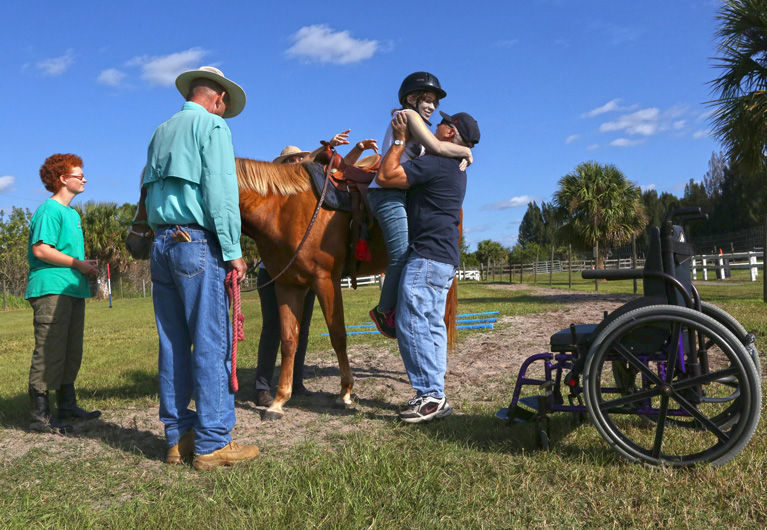
Sometimes the best medicine doesn’t come in a bottle or a pill: Sometimes it comes on four hooves.
For the past 22 years, Special Equestrians of the Treasure Coast has provided some very special medicine for area children and adults challenged by autism, Down syndrome, cerebral palsy, spina bifida, stroke, diabetes and other conditions affecting muscles and speech through its therapeutic horseback riding program.
At their compound at 7280 53rd Street in Vero Beach, a dedicated group of volunteers and specially trained instructors not only put smiles on faces, they appear to have found a way to improve the physical and mental well-being of their riders.
Just ask Susie LaCorte. Her daughter, Natalie, is nine years old and has been riding with Special Equestrians since she was four. “Natalie’s posture, balance, strength and coordination have really improved over the last five years,” says LaCorte who attributes her daughter’s improved motor skills and cognitive awareness to the horseback sessions.
Dr. Peter Wernicki, orthopedic surgeon at Pro Sports in Vero Beach, understands the many benefits of therapeutic horseback riding. He says the activity strengthens muscles and can improve flexibility, balance and confidence. “As a person’s hips move on horseback,” he says, “it is replicating the walking motion. The physically challenged can see marked improvements through therapeutic riding.”
Michelle Van Keulen certainly sees that kind of improvement. “My son, Alexzander,” she says, “has been riding with the Special Equestrians for the past three years. He has Ehlder-Danios Syndrome, a connective tissue disorder, which makes his joints very weak and easy to dislocate. Riding helps Alexzander with posture and his core body strength. Plus it has given him a lot of confidence in himself.”
However, as anyone who’s spent any time around horses knows, there’s always a fly or two around and the fly in this particular ointment is that “therapeutic horsemanship,” is rarely covered by health insurance. That’s largely because it does not lend itself to the kind of statistical evaluation commonly used on more conventional medical treatments. There are no EKGs or blood tests that can chart a rider’s progress and no algorithm exists to run through a computer.
Still, with results like Natalie’s and Alexzander’s staring them in the face, the Special Equestrians keep going.
Dr. Suzie O’Toole-Evans at Island Pediatrics in Vero Beach understands why. “The rhythm and stride of the horse is both calming to the central nervous system of our Special Equestrians and helps with their sense of balance. The children also get a real boost of self-esteem and look forward to their sessions – the joy just radiates from their facial expressions!”
Joy. That’s a rare commodity. For some, being atop a horse is probably the most welcome adventure possible. For others, who might well spend much of the rest of their day in a wheelchair or a bed, it can mean even more.
Barbara Glasow, one of the founders of the American Hippotherapy Association went a step further in a recent New York Times interview. ”Autistic kids learn to talk about horses,” she said. “Using horses to open a person’s diaphragm and get them breathing better – that’s physical therapy. But horses that give a child the desire to talk – that’s magic.’”
Vero Beach Special Equestrian’s therapeutic horsemanship program director and retired registered nurse, Vickie Penly, is even more succinct. “To a child or adult with a physical, developmental or emotional disability,” says Penly, “life looks a lot brighter on horseback.”
With the Penlys, therapeutic horsemanship is a family affair. Her husband, Dr. Richard Penly, is one of the program’s certified instructors and their daughter Michelle is an active participant in the program.
Like many non-profit organizations, Special Equestrians of the Treasure Coast isn’t exactly “rolling in clover.” Keeping its seven horses fed, shod and healthy along with all the other costs facing the organization including rents, barns, fencing, saddles, insurance and such means that this 501-C-3 must rely heavily on donations from Vero residents.
Special Equestrians offers fall, winter, spring and summer sessions of between 10 and 15 weeks each. A fall participant, for example, could expect to pay $20 per session or $300 for the quarter.
92 percent of group’s operating costs of approximately $80,000 come from grants, donations and fundraisers. Only percent is obtained through fees paid by riders.
That’s why the Penlys say they welcome all visitors and potential riders along with volunteers and, of course, potential donors, to come see what they’re doing, watch the joy radiate from those faces and hopefully, join them. Special Equestrians of the Treasure Coast is a center member of the Professional Association of Therapeutic Horsemanship, (PATH, Intl.). The barn phone number is 772-562-7603.



